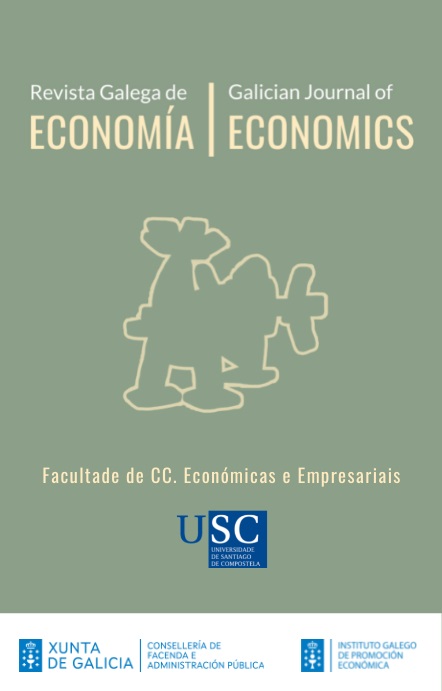O efeito semana do ano e a Hipótese dos Mercados Adaptativos: Evidências a partir de uma nova base de dados
Contenido principal del artículo
Resumen
Neste artigo estudamos pela primeira vez a anomalia de calendário designada de efeito semana do ano no mercado de acções português. O efeito semana do ano foi identificado originalmente por Levy e Yagil (2012) e refere-se à verificação de rendibilidades de mercado significativamente diferentes em algumas semanas do ano. A amostra utilizada foi construída a partir de uma nova base de dados histórica que cobre cerca de 120 anos de história do mercado accionista português. Verificou-se que a primeira e a última semanas do ano geraram rendibilidades significativamente mais elevadas do que as restantes semanas do ano. Além disso, a análise de subamostras revelou que o efeito semana do ano evoluiu de forma adaptativa ao longo do tempo. Em geral, os nossos resultados sugerem que a Hipótese dos Mercados Adaptativos proporciona uma melhor explicação para a dinâmica do mercado de acções português.
Palabras clave:
Detalles del artículo
plugins.generic.funding.fundingData
-
Fundação para a Ciência e a Tecnologia
plugins.generic.funding.funderGrants UIDB/04105/2020
Referencias
Al-Khazali, O. & Mirzaei, A. (2017). Stock market anomalies, market efficiency and the adaptive market hypothesis: Evidence from Islamic stock indices. Journal of International Financial Markets, Institutions & Money, 51, 190-208. https://doi.org/10.1016/j.intfin.2017.10.001
Aleknevičienė, V., Klasauskaitė, V., & Aleknevičiūtė, E. (2022). Behavior of calendar anomalies and the adaptive market hypothesis: evidence from the Baltic stock markets. Journal of Baltic Studies, 53(2), 187-210. https://doi.org/10.1080/01629778.2021.1990094
Balbina, M., & Martins, N. C. (2002). The Analysis of Seasonal Return Anomalies in the Portuguese Stock Market. Working Paper, 11-02, Economics and Research Department, Banco de Portugal.
Beyer, S., Garcia-Feijoo, L., & Jensen, G. R. (2013). Can you capitalize on the turn-of-the-year effect? Applied Financial Economics, 23(18), 1457–1468. https://doi.org/10.1080/09603107.2013.831168
Brock, W., Lakonishok, J., & LeBaron, B. (1992). Simple Technical Trading Rules and the Stochastic Properties of Stock Returns. The Journal of Finance, 47(5), 1731-1764. https://doi.org/10.1111/j.1540-6261.1992.tb04681.x
Darrat, A. F., Li, B., Liu, B., & Su, J. J. (2011). A fresh look at seasonal anomalies: An international perspective. International Journal of Business and Economics, 10(2), 93–116. https://ijbe.fcu.edu.tw/assets/ijbe/past_issue/No.10-2/pdf/vol_10-2-1.pdf
Fama, E. F. (1970). Efficient capital markets: a review of theory and empirical work. The Journal of Finance, 25(2), 383-417. https://doi.org/10.2307/2325486
Gilson, R. J. & Kraakman, R. H. (1984). The Mechanisms of Market Efficiency. Virginia Law Review, 70(4), 549-644. https://doi.org/10.2307/1073080
Grossman, S. J., & Stiglitz, J. E. (1980). On the Impossibility of Informationally Efficient Markets. The American Economic Review, 70(3), 393-408. https://www.jstor.org/stable/1805228
Kamstra, M. J., Kramer, L. A., & Levi, M. D. (2003). Winter blues: A SAD stock market cycle. American Economic Review, 93(1), 324-343. https://doi.org/10.1257/000282803321455322
Lakonishok, J., & Smidt, S. (1988). Are Seasonal Anomalies Real? A Ninety-Year Perspective. The Review of Financial Studies, 1(84), 403-425. https://doi.org/10.1093/rfs/1.4.403
Levy, T., & Yagil, J. (2012). The week-of-the-year effect: Evidence from around the globe. Journal of Banking & Finance, 36(7), 1963-1974. https://doi.org/10.1016/j.jbankfin.2012.03.004
Lo, A. W. (2004). The Adaptive Markets Hypothesis. The Journal of Portfolio Management, 30(5), 15-29. https://doi.org/10.3905/jpm.2004.442611
Lobão, J. (2018). Are African stock markets inefficient? New evidence on seasonal anomalies. Scientific Annals of Economics and Business, 65(3), 283-301. https://doi.org/10.2478/saeb-2018-0023
Lobão, J. (2019). Seasonal anomalies in the market for American depository receipts. Journal of Economics, Finance and Administrative Science, 24(48), 241-265. https://doi.org/10.1108/JEFAS-09-2018-0088
Lobão, J., & Lobo, C. (2018). Sazonalidade Mensal e o Efeito Passagem de Ano: Nova Evidência da Euronext Lisbon. Portuguese Journal of Finance, Management and Accounting, 4(8), 3-25. http://u3isjournal.isvouga.pt/index.php/PJFMA/article/view/316
Mata, M. E., da Costa, J. R., & Justino, D. (2017). The Lisbon stock exchange in the twentieth century. Coimbra University Press.
Plastun, A., Sibande, X., Gupta, R., & Wohar, M. E. (2020). Historical evolution of monthly anomalies in international stock markets. Research in International Business and Finance, 52, 101-127. https://doi.org/10.1016/j.ribaf.2019.101127
Qadan, M., Aharon, D. Y., & Eichel, R. (2019). Seasonal patterns and calendar anomalies in the commodity market for natural resources. Resources Policy, 63, 101-435. https://doi.org/10.1016/j.resourpol.2019.101435
Qadan, M., Aharon, D. Y., & Eichel, R. (2022). Seasonal and Calendar Effect and the Price Efficiency of Cryptocurrencies. Finance Research Letters, 46, 102354. DOI: https://doi.org/10.1016/j.frl.2021.102354
Redondo López, J. A., & Fernández Fernández, L. (2018). Teoría Financiera y Crisis: Una Revisión de la Racionalidad del Individuo desde la Teoria del Comportamiento. Revista Galega de Economía, 27(3), 101-110. https://doi.org/10.15304/rge.27.3.5440
Rosini, L., & Shenai, V. (2020). Stock returns and calendar anomalies on the London Stock Exchange in the dynamic perspective of the Adaptive Market Hypothesis: A study of FTSE100 & FTSE250 indices over a ten year period. Quantitative Finance and Economics, 4(1), 121-147. https://doi.org/10.3934/QFE.2020006
Seif, M., Docherty, P., & Shamsuddin, A. (2017). Seasonal anomalies in advanced emerging stock markets. The Quarterly Review of Economics and Finance, 66, 169-181. https://doi.org/10.1016/j.qref.2017.02.009
Siegel, J. (2014). Stocks for the Long Run. 4ª. edição. McGraw-Hill.
Silva, P. M. (2010). Calendar ‘anomalies’ in the Portuguese stock market. Investment Analysts Journal, 39(71), 37-50. https://doi.org/10.1080/10293523.2010.11082518
Sun, Q., & Tong, W. H. S. (2010). Risk and the January effect. Journal of Banking & Finance, 34(5), 965–974. https://doi.org/10.1016/j.jbankfin.2009.10.005
Urquhart, A., & McGroarty, F. (2014). Calendar effects, market conditions and the Adaptive Market Hypothesis: Evidence from long-run U.S. data. International Review of Financial Analysis, 35, 154-166. https://doi.org/10.1016/j.irfa.2014.08.003
Xiong, X., Yongqiang, M. Xiao, L. & Dehua, S. (2019). An empirical analysis of the Adaptive Market Hypothesis with calendar effects: Evidence from China. Finance Research Letters, 31, 321-333. https://doi.org/10.1016/j.frl.2018.11.020
Zhang, C. Y., & Jacobsen, B. (2013). Are Monthly Seasonals Real? A Three Century Perspective. Review of Finance, 17(5), 1743-1785. https://doi.org/10.1093/rof/rfs035
Zhang, C. Y., & Jacobsen, B. (2021). The Halloween indicator, ‘Sell in May and Go Away’: Everywhere and all the time. Journal of International Money and Finance, 110. https://doi.org/10.1016/j.jimonfin.2020.102268







